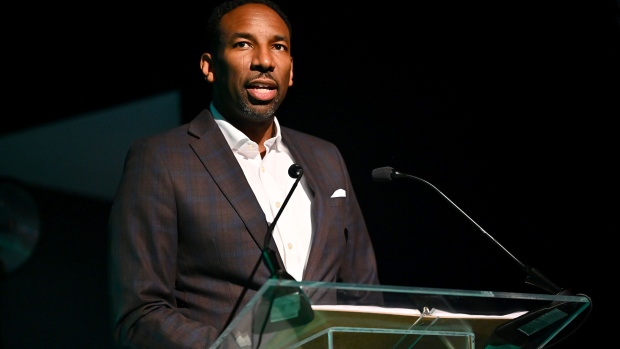Mar 1, 2024
Atlanta Wants Microsoft to Bring City 15,000 Jobs or Return Land
, Bloomberg News

(Bloomberg) -- Atlanta Mayor Andre Dickens is pressing Microsoft Corp. for clarity about the future of a parcel of city land that was supposed to become a major corporate campus for the tech giant.
Microsoft announced in 2021 that it would build a new complex on a 90-acre (36-hectare) site in Atlanta’s Grove Park neighborhood, creating as many as 15,000 jobs in the city. But the project came to a standstill last year before officially breaking ground, when the company said it was re-evaluating its global real estate portfolio post-pandemic.
Dickens said he’s reaching out to Microsoft in the next week to get an update on the project and whether it’s still viable. If not, Dickens said he’s ready to try to take back the land for the city or partner with a developer.
“We really want them to develop their property or offer it back to us so we can develop it,” Dickens said in an interview at Bloomberg’s Atlanta office. “Even if you don’t know what you want to do, just let us know what you know you won’t be able to do.”
Microsoft declined to comment. The company has previously said the Grove Park property isn’t for sale and they’ll re-engage in planning efforts when the time is right.
The company has already opened a new office in the Atlantic Yards district in 2022, housing 2,000 employees. That office, along with the Grove Park campus about five miles away and three new data centers, were part of Microsoft’s vision to make the Atlanta region one of its largest hubs outside its headquarters in Redmond, Washington, which provides about 50,000 jobs. The company employs 220,000 people globally.
The uncertainty over Microsoft’s expansion reflects a broader trend of technology and other companies scaling back their office space and workforces in the wake of the pandemic, which has accelerated the move to remote and hybrid work. The trend is having implications for major US cities, including Atlanta, which is facing one of the highest office vacancy rates in the country, at about 24% by the end of last year, according to brokerage Cushman & Wakefield Plc.
More than 20% of offices in the Atlanta area financed with commercial mortgage-backed securities are at least 90 days delinquent, the most of any metro area, according to data compiled by Bloomberg. Property owners use CMBS to finance a range of properties, including offices, retail and industrial assets.
Read More: Billionaire Ressler Defies Market With $5 Billion Atlanta Plan
Dickens said he’s not worried about demand for amenity-rich and high-quality Class A buildings, which are still attracting tenants and investment especially compared to the older and less desirable Class B and C buildings. He pointed to cranes in the skyline as signs of new development, such as a $5 billion Centennial Yards project by CIM Group in partnership with backers led by Atlanta Hawks owner Tony Ressler in a gritty former rail yard known as The Gulch, which will include hotels, restaurants and offices.
Still, Dickens said he’s monitoring how the decline in market values for office buildings will affect the city’s budget, which relies heavily on property taxes from commercial real estate owners. About 19% of the city’s tax revenue comes from the commercial property market, according to the Tax Policy Center, a non-partisan think tank. That is more than many other major US cities such as Miami and New York, which get about 10% of their income from such taxes.
“We haven’t seen it, but we’re looking for what will happen” in the coming months, he said. “We’ll see if there’s been some adjustments in our commercial property taxes.”
While the office market has been more challenging, Atlanta’s residential market has remained robust, said Dickens. Strong job growth and a pandemic real estate boom, fueled in part by people moving from pricier cities, have sent the area’s housing costs soaring. The average rent in the Atlanta area jumped 34% to $1,897 since the pandemic began in 2020, outpacing the 29% national increase, according to data from Zillow Group Inc.
Read More: Cerberus, Starwood Plagued by Squatters in Single-Family Rentals
One of the biggest challenges to making housing affordable for the city’s residents is the presence of institutional investors or corporate buyers, who purchase large numbers of houses for investment purposes, said Dickens. Atlanta is the largest market for such investors, who own about 72,000 homes in the area, according to data company SFR Analytics.
“There are individuals who buy up lots of property, sight unseen, using big capital” and squeezing would-be homebuyers out of the market, Dickens said. “Those investors are investing with other people’s money too. They’re using pension funds” and other types of investment vehicles.
To help fund affordable housing, the city’s municipal debt financing during Dickens’ tenure has included a $100 million housing opportunity bond, which was matched by $200 million in philanthropic funds, according to the mayor’s office.
Overall, Atlanta’s financial position and creditworthiness are strong, according to data compiled by Bloomberg which includes total assets and liabilities, income and employment measures, building permits, house prices and revenue. Its outstanding general obligation bonds are rated Aa1 and AA+ by Moody’s Investors Service and Fitch Ratings, respectively. The state of Georgia’s credit is top-rated as well.
“Having that great credit rating just enables us to do more,” said Dickens.
--With assistance from Michael Sasso, John Gittelsohn and Amanda Albright.
©2024 Bloomberg L.P.





